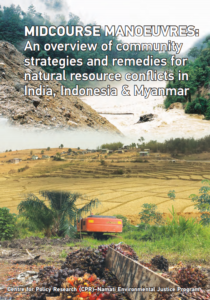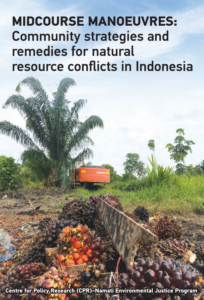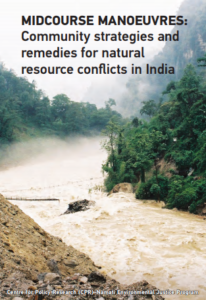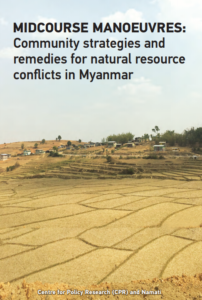Namati Mailers | News & Blogs
New Report Pushes Back Against Global Land Rush
After three years of intensive research, we are thrilled to launch Midcourse Manoeuvers: Community Strategies and Remedies for Natural Resource Conflicts in India, Indonesia, and Myanmar, a groundbreaking resource for frontline practitioners working with communities affected by land use change.
It’s no secret that corporations and private investors, eager to turn a profit, are fueling the land rush in these three post-colonial Asian countries. Mining, hydropower, industrial, and plantation projects are denying farmers, fisher people, and pastoralists the power to manage the lands and natural resources they depend on for their survival.
What’s less known are the nature and extent of these land use changes, the harmful impacts on communities, and the powerful community-level strategies used to demand justice. Midcourse Manoeuvers fills these gaps.
Drawing on 30-years of primary and secondary data, this suite of four reports examines the political and economic conditions that lead to mass displacements, loss of livelihoods, and environmental devastation that communities experience daily.
Data compiled in the reports reveals the broad consumption of lands by corporations, including that 21% and 10% of the total land area of Indonesia and Myanmar respectively, have been approved for mining projects.
Communities are engaging in dynamic resistance to fight off the erasure of their rights. Case studies detail the range of strategies communities employ, often in tandem, to keep pace with the global land rush – including protests, administrative remedies, public hearings, litigation, and negotiations – and elaborate on how, when, and under what conditions each of these strategies was most effective to demand justice.
The lessons in these reports, developed by the CPR-Namati Environmental Justice Program with support from the International Development Research Centre (IDRC), provide practitioners a valuable index of how community strategies and remedies are deployed, and to what effect, during a conflict.
What are the challenges and successes you’ve experienced while advocating for the rights of communities affected by land use change? Which resistance strategies have been most effective for you? Add your voice to the Global Legal Empowerment Network’s community forum discussion.
 Across the globe, governments, corporations, and private investors enjoy major power imbalances that pave the way for widespread land confiscation. Communities, whose lands are taken and polluted from right under their feet, are marshalling powerful strategies to demand justice. We invite you to read about their inspiring efforts in the overview report on the methodology and findings from the three countries.
Across the globe, governments, corporations, and private investors enjoy major power imbalances that pave the way for widespread land confiscation. Communities, whose lands are taken and polluted from right under their feet, are marshalling powerful strategies to demand justice. We invite you to read about their inspiring efforts in the overview report on the methodology and findings from the three countries.
For a deeper dive, check out the individual country-level reports.




